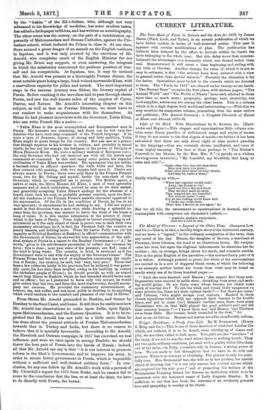The Maid of Florence: a Legend of the Olden Time.
(Sampson Low and (Jo.)—This is, in fact, a terribly tragic story of the thirteenth century, and no more a "legend," in the ordinary acceptation of the term, than any novel of the day. Bianca, the daughter of Savona, a merchant of Florence, loves Colonna, the head of an illustrious house. He recipro- cates her love, but upon the slightest inducements he abandons her for another ; she, in revenge, brings about his death, and commits suicide. This is the plain English of the narrative,—the extraordinary part of it is to follow. Although printed as prose, the whole of the conversations are carried on in a sort of doggerel blank verse, of which the following is an example, neither better nor worse than what may be found on nearly every one of its three hundred pages :— 4" Stich she once boasted,' said Bianca ; she cannot find them now. Degenerate sons succeed to noble sires ; shrinking from arms, and seek- ing sordid gains. Or are there some whose bosoms yet retain some spark of martial fire ? To rob the weak and wreak their vengeance on some private foe, these are their valiant deeds Yet there are some,' said Colonna, who might escape your censure. Ranked in those chosen squadrons which with me opposed their bosoms to the hostile lance, and put to route [sic] Sienna's warlike *one, there were some Florentines who on that field played the good soldier's part and did
their country honour I know them not,' said Bianca, and Florence owes them little. Her banner, lately trampled in the dust,'" dte.
And so on ad ltbitum. Manner and matter are alike insufferably tedious.


































 Previous page
Previous page